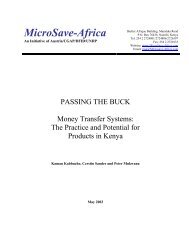You also want an ePaper? Increase the reach of your titles
YUMPU automatically turns print PDFs into web optimized ePapers that Google loves.
Democracy and Discontented Smokers<br />
Don Mickelwait was serious about health—his own<br />
and that <strong>of</strong> his employees. To this day, <strong>DAI</strong> staff enjoy<br />
company-subsidized gym memberships and sponsored<br />
athletic activities. Mickelwait was also, in his own words,<br />
“an early adopter,” whether buying personal computers or<br />
waging war on secondhand smoke.<br />
In the early 1980s, nearly a decade before the issue<br />
became mainstream, Mickelwait imposed a smoking ban<br />
at <strong>DAI</strong>. “I decided that having to breathe someone else’s<br />
cigarette smoke was simply not what we should have to<br />
do in an <strong>of</strong>fice.” It was, <strong>of</strong> course, more complicated than<br />
that. <strong>DAI</strong> was home to few smokers but to many fervent<br />
believers in individual rights, and at the time, smoking<br />
bans were still considered infringements <strong>of</strong> the rights <strong>of</strong><br />
smokers. Mickelwait soon received a petition signed by<br />
22 <strong>DAI</strong> employees, few <strong>of</strong> whom were smokers. Although<br />
the President and chief shareholder <strong>of</strong> <strong>DAI</strong> valued employee<br />
involvement more than most, in this instance he<br />
was willing to hold the line against democracy at work.<br />
The ban held, and in time the general public—like Mickelwait<br />
at the time—would more commonly uphold the rights<br />
<strong>of</strong> nonsmokers over those <strong>of</strong> smokers.<br />
32<br />
Yet the process <strong>of</strong> bringing pr<strong>of</strong>essional management to<br />
<strong>DAI</strong> had been a fitful one. The company’s veterans, after all,<br />
viewed themselves more as development pr<strong>of</strong>essionals than<br />
business managers, and they did not take to management<br />
roles easily. As one veteran put it, “In the home <strong>of</strong>fice, a divisional<br />
manager was usually a person who was between overseas<br />
assignments and couldn’t wait to get back into the field,<br />
where the real work was done.” Under those circumstances,<br />
<strong>DAI</strong> saw no alternative but to bring in trained managers and<br />
administrators; the “none <strong>of</strong> us knows how” blank check<br />
that Barclay had received from Mickelwait no longer applied.<br />
Ben Stauss, who came in as controller in 1980, succeeded<br />
John Buck as Vice President <strong>of</strong> Finance and standardized<br />
accounting practices and financial reporting. But many <strong>of</strong> the<br />
veterans found the new systems and the people implementing<br />
them quite mysterious. Gary Kilmer recalls management<br />
at headquarters “looking very earnest about things I didn’t<br />
understand.”<br />
<strong>DAI</strong>, with its ambivalence about business orthodoxy, wasn’t<br />
the ideal place for every breed <strong>of</strong> development pr<strong>of</strong>essional.<br />
Some <strong>of</strong> this awkwardness was inevitable, because <strong>DAI</strong><br />
expected a more personally engaged type <strong>of</strong> management<br />
than was taught in business school, but some <strong>of</strong> it was due to<br />
the peculiar culture where, very <strong>of</strong>ten, respect could only be<br />
earned through long service overseas. Even old-timers harbored<br />
an “us versus them” mentality, pulling for the company<br />
when at headquarters and chafing at its restrictions when in<br />
the field.<br />
The difficulties in developing a new generation <strong>of</strong> pr<strong>of</strong>essionals<br />
were in part a result <strong>of</strong> changing expectations among<br />
its clients. Ten or 15 <strong>years</strong> earlier, when the development<br />
consulting pr<strong>of</strong>ession was itself very new, a start-up firm such<br />
as <strong>DAI</strong> could hire young, generalist doctoral graduates with<br />
Peace Corps backgrounds, and they could quickly earn their



